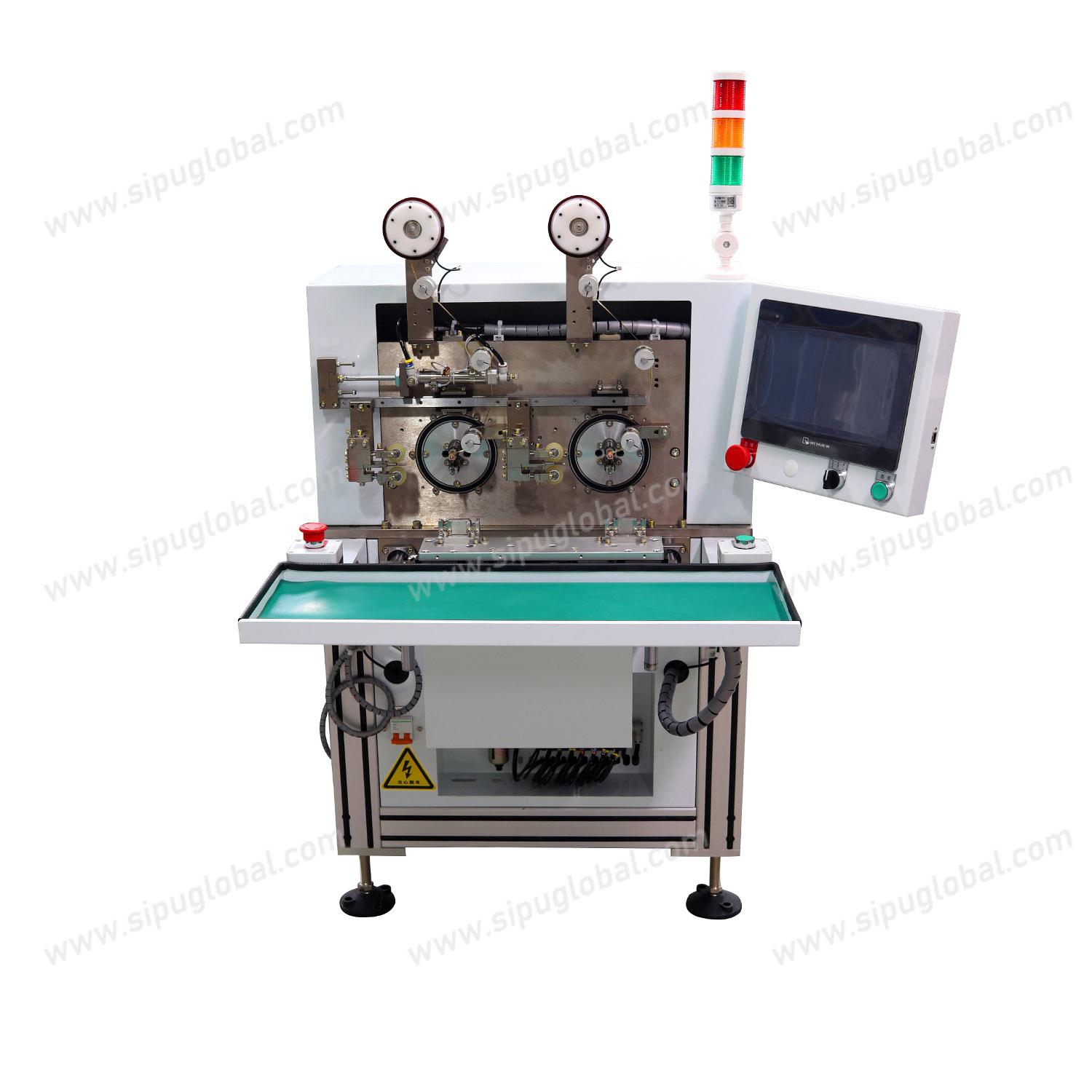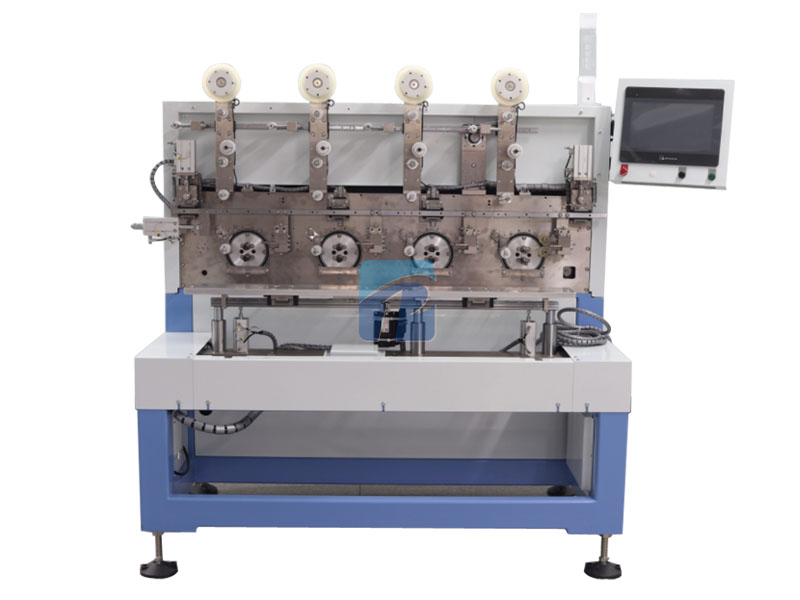
What is What is Coil Taping Machine?
2025-10-05 14:00You must be quite curious about the tape wrapped around the outside of a coil. Beyond its core function of insulation, the tape on coils serves multiple key purposes: mechanically, it prevents wire abrasion, secures the coil's shape, and cushions vibrations to avoid wire fatigue and breakage.
In today's coil manufacturing industry, insulation quality and production efficiency have become the key factors determining product performance and market competitiveness. The Automatic Coil Taping Machine wraps insulating tape evenly and quickly on the surface of electromagnetic coils through an automated method. It not only achieves higher efficiency than manual operation but also significantly reduces human errors, helping enterprises meet international safety and quality standards.
The newly launched next-generation fully automatic winding and taping machine by Xiamen SIPU Mechanical is specifically developed to meet this demand. This equipment adopts a servo-driven tape head, an intelligent control system, and an adjustable tension device, ensuring stable and reliable insulation performance.

This automatic coil winding and taping machine is suitable for the production and manufacturing of coils in the electronics, electrical appliances and other industries, such as transformer coils, motor coils, etc., and can meet the needs of enterprises for large-scale and high-quality production.
Currently, SIPU offers both semi-automatic and fully automatic taping machines, with 2-station and 4-station options respectively. Of course, if you need more stations for higher efficiency, we also provide customized solutions.

Semi-automatic

Automatic
Tape Selection in Coil Taping
When using a coil taping machine, choosing the right insulation tape is just as important as the machine itself. Different tapes provide different levels of heat resistance, insulation, and flexibility. For example, polyester tape is often used for motors and small coils, while polyimide tape (Kapton tape) is preferred in high-temperature applications such as automotive ABS coils. In large transformers or generators, glass-fiber reinforced tapes are applied for better mechanical strength. SIPU’s coil taping machine is designed to work with a wide range of insulation tapes, giving manufacturers the flexibility to select the best material for their products.
Process Optimization and Automation
Choosing the right tape is just the first step; in actual production, process stability is equally crucial. Different coils require different overlap rates and tension levels. Relying on manual operation makes it difficult to maintain consistency over extended periods, easily leading to material waste and uneven insulation. SIPU's taping machines, equipped with servo-driven tension control and intelligent adjustment systems, allow operators to easily set parameters such as tape speed and overlap ratio, ensuring precise and stable taping for every coil.
Quality and Reliability
Insulation quality directly determines the reliability and service life of coil products. For example, poor taping ofmotor windings may cause overheating or even burnout; unstable insulation in automotive ABS coils could affect the safety of braking systems. With SIPU's advanced taping machines, manufacturers can achieve stable and uniform insulation layers, successfully meeting stringent testing standards for temperature resistance, voltage resistance, and long-term use—ensuring the performance and safety of the final products.
The future of coil taping is moving toward smart automation. New insulation materials, such as eco-friendly and ultra-high-temperature-resistant tapes, are being developed to meet next-generation requirements. SIPU is actively investing in these innovations, aiming to deliver equipment that is faster, smarter, and more energy-efficient.
By combining tape flexibility, precise process control, and advanced automation, SIPU continues to support global coil manufacturers in reaching higher efficiency, better quality, and stronger competitiveness in the market.
FAQ
1. What is a Coil Taping Machine?
A Coil Taping Machine is used to wrap insulation tape around coils automatically. It improves insulation quality, saves time compared to manual work, and is widely used in industries such as motors, transformers, generators, and automotive coils.
2. How do you choose the right Coil Taping Machine?
When choosing a machine, consider your coil size, production volume, and coil shapes. Check if the machine meets your insulation quality standards and whether the supplier offers reliable support and customization options.
3. Can a Coil Taping Machine handle different coil shapes?
Yes. Modern machines are designed to handle various coil sizes and shapes, including irregular or large coils. By adjusting machine settings, you can achieve consistent and precise insulation for each coil type.
4. What maintenance does a Coil Taping Machine need?
Regular cleaning and inspection are important. Clean the tape head, check the tension system, and inspect moving parts for wear. Following the supplier’s maintenance guide helps keep the machine reliable and extends its service life.
5. Is it safe to operate a Coil Taping Machine?
Yes. The machine is equipped with protective guards, emergency stop buttons, and safety sensors. Operators should follow safety rules, wear protective gear, and use the built-in safety features during operation.
6. How does automation improve performance?
Automation allows precise control of tape speed, tension, and overlap. It reduces human error, increases production efficiency, and ensures consistent, high-quality insulation across all coils.
7. What types of tape can be used?
Common insulation tapes include polyester, polyimide, and other heat-resistant materials. The choice depends on coil type, application, and industry standards. Machines are flexible, allowing different tape widths and thicknesses.
8. Where are Coil Taping Machines used?
These machines are widely applied in motor factories, transformer production, generator workshops, and railway equipment manufacturing. They help meet strict insulation, durability, and safety requirements across industries.
